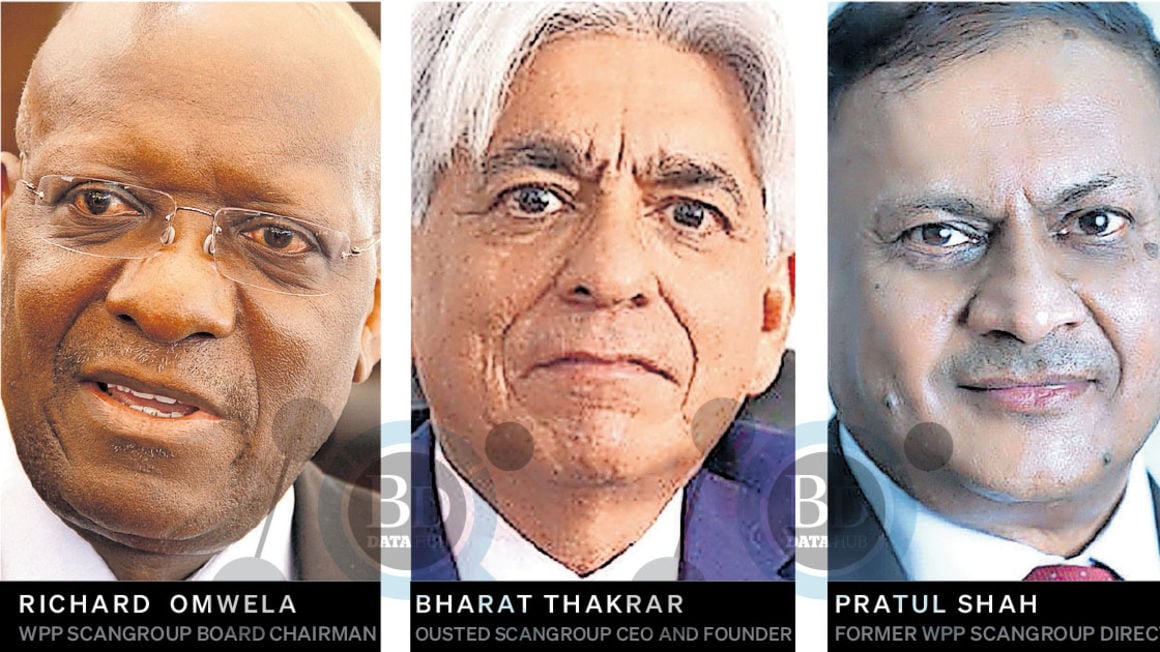Former Scangroup CEO Bharat Thakrar has sued the firm’s UK-based parent WPP Plc, its subsidiary WPP Scangroup, and all its directors in a Nairobi court for alleged loss and reputational, emotional and mental damage linked to the events that followed his suspension from the company he founded.
He is seeking more than half a billion shillings in Kenya, plus loss of potential earnings had he still been CEO of Scangroup, and reputational damage, which, according to UK media, could be in the region of £24 million (Sh4.3 billion), if the claim succeeds.
Mr Thakrar, who still owns a 10.49 percent stake in WPP Scangroup, has sued the advertising multinational, has also accused the UK-based advertising agency of loss of a significant business opportunity to generate revenue through his children’s company where he served as a consultant.
WPP, he alleges, gave Airtel Africa further defamatory and false statements that collectively could be taken to mean that he was guilty of allegations levelled against him.
“I also believe that due to WPP’s interference with a prospective business relationship between Airtel Africa Plc and I, I have divested of the full value of the prospective business,” he says in an affidavit.
Mr Thakrar is also seeking a permanent injunction to prohibit the defendants and their agents from the continual publication of defamatory expressions against him and an order for the parties to make an unqualified retraction of the allegations.
He is accusing WPP and its Kenyan subsidiary of a ‘conspiracy to injure his status and reputation as a founder shareholder, director and CEO of WPP Scangroup”.
His suspension, he argues, was a result of ‘surreptitious investigation using unlawful means.’ Mr Thakrar claims that WPP manipulated itself into a position to control the board through additional directors, violating the guidelines of the Capital Markets Authority (CMA) of having one in three independent directors.
“The plaintiff’s causes of action arise from 1st defendant (WPP Plc)’s unlawful interference with contractual relations…and or unlawful inducement of breach of contract in respect of the plaintiff’s contract with the 2nd defendant (WPP Scangroup),” the suit papers say.
Mr Thakrar argues that WPP Plc and WPP Scangroup breached their duty of care not to act in a manner that caused him financial loss, loss of reputation and invasion of privacy in his capacity as a founder shareholder, director and CEO of the company.
The directors, including two local board members at the time, Richard Omwela and Pratul Shah, are sued for lack of fiduciary duties and wilfully and negligently allowing WPP to interfere with the internal affairs of WPP and allowing WPP to control the entire process of the investigation.
They are also being accused of failure to disclose to the CMA the extent of the involvement of WPP and that of Jon Eggar who was the chief financial officer (CFO) during the financial periods under investigation.
Mr Thakrar accuses the firm’s directors that despite not seeing a draft report prepared by Control risk, and in breach of their statutory duty to act independently, they proceeded to endorse the resolution to suspend him.
He says instead of subjecting himself through a process that was clearly pre-determined, he chose to resign from his position as CEO on March 23, 2021.
He describes the resignation as ‘not voluntary.’ The entire process of his ouster and the investigation, he says in court papers, was spearheaded by Andrea Harris, Group Chief Counsel of WPP Pls from London despite the board having appointed a committee to manage this process.
He further avers that Andrea Harris frequently participated in board meetings of Scangroup to brief the board on the investigation.
At the time of exiting, Mr Thakrar was directed to complete the hand-over process by surrendering all items to Ben Kelly, WPP’s head of risk.
He is further accusing WPP of protecting Jon Eggar, the former substantive CFO for the period under alleged investigation who was neither adversely mentioned in the internal investigation report nor sanctioned, saying WPP’s actions were motivated by racial bias and neo-colonialist practices. He contends that these actions were discriminatory contrary to Article 27 of the Constitution of Kenya 2010.











